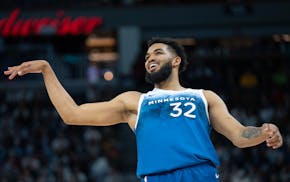The idea that Gophers football coach Tim Brewster has earned a contract extension is the equivalent of shouting "Four more years!" in the direction of George W. Bush.
Considering Dubya's body language of recent months, he wouldn't want that extra duty if it was constitutionally possible. But here in Minnesota, our two-time football flop has been campaigning for a longer term -- and appears to have landed the key lapdogs to provide it for him.
Joel Maturi, the Gophers athletic director, made it clear last week that he intends to give away more of his department's money with a Brewster extension. And since Maturi doesn't do these things without a blessing from on high, we must assume that university president Robert Bruininks is on board.
It was only a couple of years ago that the president's office was offering comments that -- as the university applied higher admissions standards for students in general -- it would be doing the same for athletes receiving scholarships.
Since then, Bruininks has scuttled that notion and turned into a regular Bobby Ballgame.
A year ago, Brewster presented many recruits with low ACTs for admission, and most were allowed to slide through. Now the admissions people have become so generous that quarterback MarQueis Gray, bounced a year ago after questions over a mysterious improvement in a college board test, has been cleared to enroll in January.
Maturi cited academics among his reasons for wanting to give Brewster an extension. The supporting evidence of this is that the Gophers had more players -- 27 -- on the Big Ten's all-academic team this fall than any other school.
The players were required to be letterwinners, at least in their second year and to be carrying a grade-point average above 3.0.
If academics carry the importance Maturi would have us believe, then Glen Mason still would be on the job, since the large majority of these 27 student-athletes were his recruits.
The signees from Brewster's 2008 recruiting class -- the one with a historically low ACT profile -- were not eligible for this list. We can go back to the 22 players originally signed in Brewster's first recruiting class in 2007 to study their academic greatness.
Among those recruits, three are among the 27 Gophers on the all-academic team: lineman Eric Small and backs Ryan Collado and Kyle Theret from the defense. And 11 are no longer in the program.
That's 14 percent all-academic and 50 percent not around.
It was 1989 when the Knight Commission on Intercollegiate Athletics was formed in an attempt to bring reasonable academic standards to big-time athletics.
Two decades later, Bobby Ballgame's administration is explaining the admission of an increased number of high-risk recruits by saying the university now has a system in place to improve the chances for academic survival for these athletes.
Too bad the current system wasn't in place 12-15 years ago. Maybe there wouldn't have been such an urge with Clem's hoopsters to visit Jan Gangelhoff.
Trying to pass off Brewster as being hardcore on academics rates second on the hogwash meter to the idea that he has been the architect of a significant on-field turnaround.
To review:
Glen Mason's 2006 Gophers were 3-5 in the Big Ten, 6-6 overall with three preconference victories over non-BCS teams and a loss at California. This was followed by a loss to Texas Tech in the Insight Bowl.
Brewster's 2008 Gophers were 3-5 in the Big Ten, 7-5 overall with four preconference victories over non-BCS teams and another date in an Insight Bowl.
You have to be from Neptune -- or the Range -- to see this as improvement worth a multimillion-dollar extension for a coach with three years left on his contract.
Brewster's pitch to Maturi, Bobby Ballgame and Gopher Neighborhood is that he should be judged against 1-11 in 2007 to the current 7-5. There's a recent article on gophersports.com describing this "tremendous turnaround" and pointing out the six-victory increase is the largest in the NCAA division formerly called I-A.
The attempt to search the website's archive for last December's story on where an increase of five losses rated nationally was unsuccessful.
Fortunately, a little research allows us to provide the answer: Only Louisville's fall from 11 regular-season victories in 2006 to six in 2007 equaled Brewster taking the Gophers from six to one.
Patrick Reusse can be heard weekdays on AM-1500 KSTP at 6:45 and 7:45 a.m. and 4:40 p.m. • preusse@startribune.com

Reusse: Success on court helped Timberwolves do strong business

Reusse: Taylor's story. 'I just bought the Minnesota Timberwolves.'

Reusse: Back from injury, Towns doesn't have to carry load


